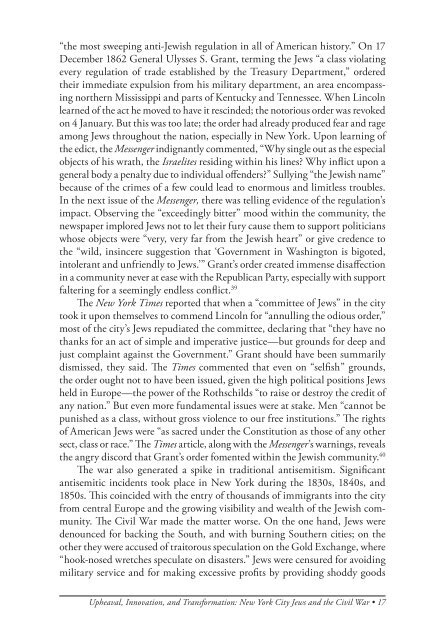American Jewish Archives Journal, Volume 64, Numbers 1 & 2
American Jewish Archives Journal, Volume 64, Numbers 1 & 2
American Jewish Archives Journal, Volume 64, Numbers 1 & 2
Create successful ePaper yourself
Turn your PDF publications into a flip-book with our unique Google optimized e-Paper software.
“the most sweeping anti-<strong>Jewish</strong> regulation in all of <strong>American</strong> history.” On 17<br />
December 1862 General Ulysses S. Grant, terming the Jews “a class violating<br />
every regulation of trade established by the Treasury Department,” ordered<br />
their immediate expulsion from his military department, an area encompassing<br />
northern Mississippi and parts of Kentucky and Tennessee. When Lincoln<br />
learned of the act he moved to have it rescinded; the notorious order was revoked<br />
on 4 January. But this was too late; the order had already produced fear and rage<br />
among Jews throughout the nation, especially in New York. Upon learning of<br />
the edict, the Messenger indignantly commented, “Why single out as the especial<br />
objects of his wrath, the Israelites residing within his lines? Why inflict upon a<br />
general body a penalty due to individual offenders?” Sullying “the <strong>Jewish</strong> name”<br />
because of the crimes of a few could lead to enormous and limitless troubles.<br />
In the next issue of the Messenger, there was telling evidence of the regulation’s<br />
impact. Observing the “exceedingly bitter” mood within the community, the<br />
newspaper implored Jews not to let their fury cause them to support politicians<br />
whose objects were “very, very far from the <strong>Jewish</strong> heart” or give credence to<br />
the “wild, insincere suggestion that ‘Government in Washington is bigoted,<br />
intolerant and unfriendly to Jews.’” Grant’s order created immense disaffection<br />
in a community never at ease with the Republican Party, especially with support<br />
faltering for a seemingly endless conflict. 39<br />
The New York Times reported that when a “committee of Jews” in the city<br />
took it upon themselves to commend Lincoln for “annulling the odious order,”<br />
most of the city’s Jews repudiated the committee, declaring that “they have no<br />
thanks for an act of simple and imperative justice—but grounds for deep and<br />
just complaint against the Government.” Grant should have been summarily<br />
dismissed, they said. The Times commented that even on “selfish” grounds,<br />
the order ought not to have been issued, given the high political positions Jews<br />
held in Europe—the power of the Rothschilds “to raise or destroy the credit of<br />
any nation.” But even more fundamental issues were at stake. Men “cannot be<br />
punished as a class, without gross violence to our free institutions.” The rights<br />
of <strong>American</strong> Jews were “as sacred under the Constitution as those of any other<br />
sect, class or race.” The Times article, along with the Messenger’s warnings, reveals<br />
the angry discord that Grant’s order fomented within the <strong>Jewish</strong> community. 40<br />
The war also generated a spike in traditional antisemitism. Significant<br />
antisemitic incidents took place in New York during the 1830s, 1840s, and<br />
1850s. This coincided with the entry of thousands of immigrants into the city<br />
from central Europe and the growing visibility and wealth of the <strong>Jewish</strong> community.<br />
The Civil War made the matter worse. On the one hand, Jews were<br />
denounced for backing the South, and with burning Southern cities; on the<br />
other they were accused of traitorous speculation on the Gold Exchange, where<br />
“hook-nosed wretches speculate on disasters.” Jews were censured for avoiding<br />
military service and for making excessive profits by providing shoddy goods<br />
Upheaval, Innovation, and Transformation: New York City Jews and the Civil War • 17
















